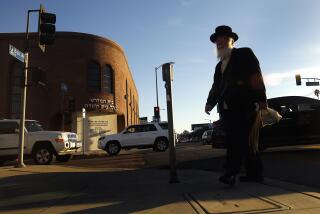Synagogues are closed, but L.A.’s Jews find unity during coronavirus crisis
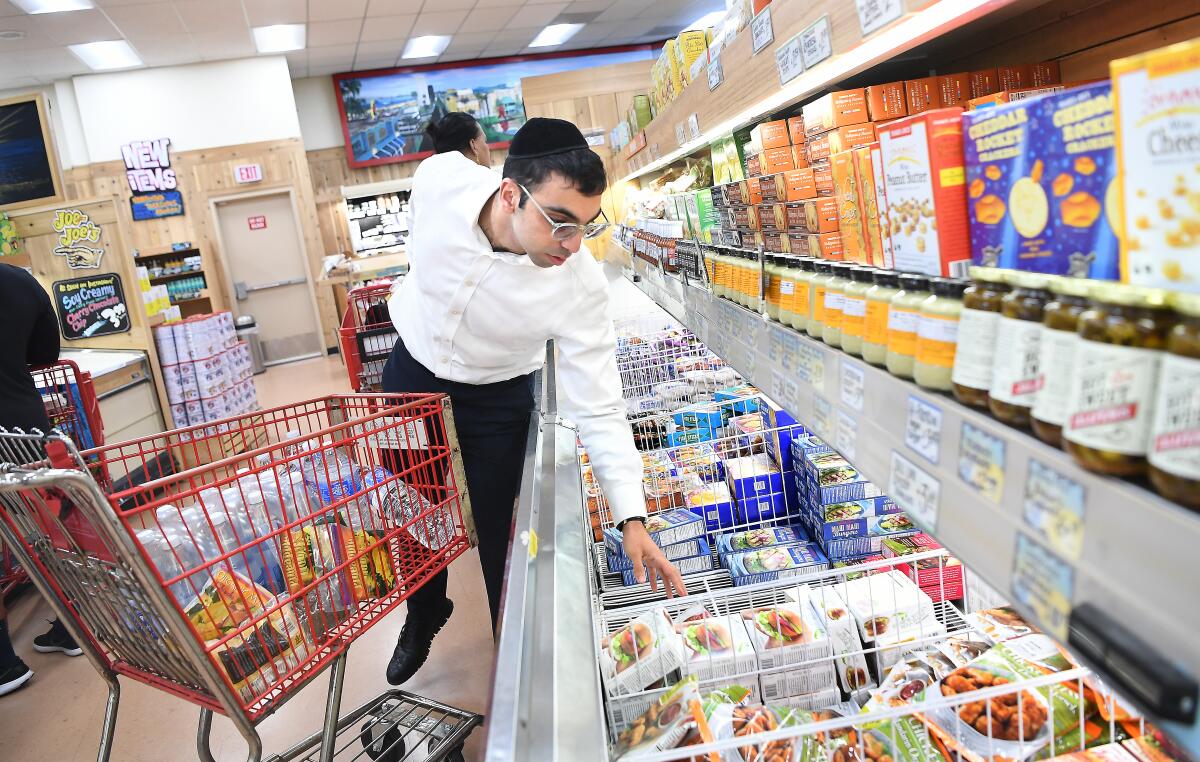
- Share via
Eli Moji fidgeted as he thought about the last message that had been posted to the WhatsApp group. A Holocaust survivor who couldn’t leave her home needed a delivery in Beverly Hills. There were more than 100 people in the group, but for 30 minutes, her post had remained unanswered.
Moji, 26, was already doing grocery shopping for two other seniors Thursday night. Nevertheless, as he waited in line outside a Trader Joe’s in Fairfax, he scanned his phone contacts and began making calls. He found a taker, but right after he hung up, he saw that someone else had responded to the message.
“My brother got it,” said Moji, relieved.
As the coronavirus continues to restrict daily life, neighborhoods and communities of faith are grappling with how they can help those in need. In the Jewish community of Los Angeles, where synagogues are closed and communal prayer has moved to online platforms such as Zoom, individuals are finding ways to be of service. They’ve formed networks to deliver food to the elderly and home-bound, support struggling kosher businesses, and help those worried about how to maintain Jewish traditions.
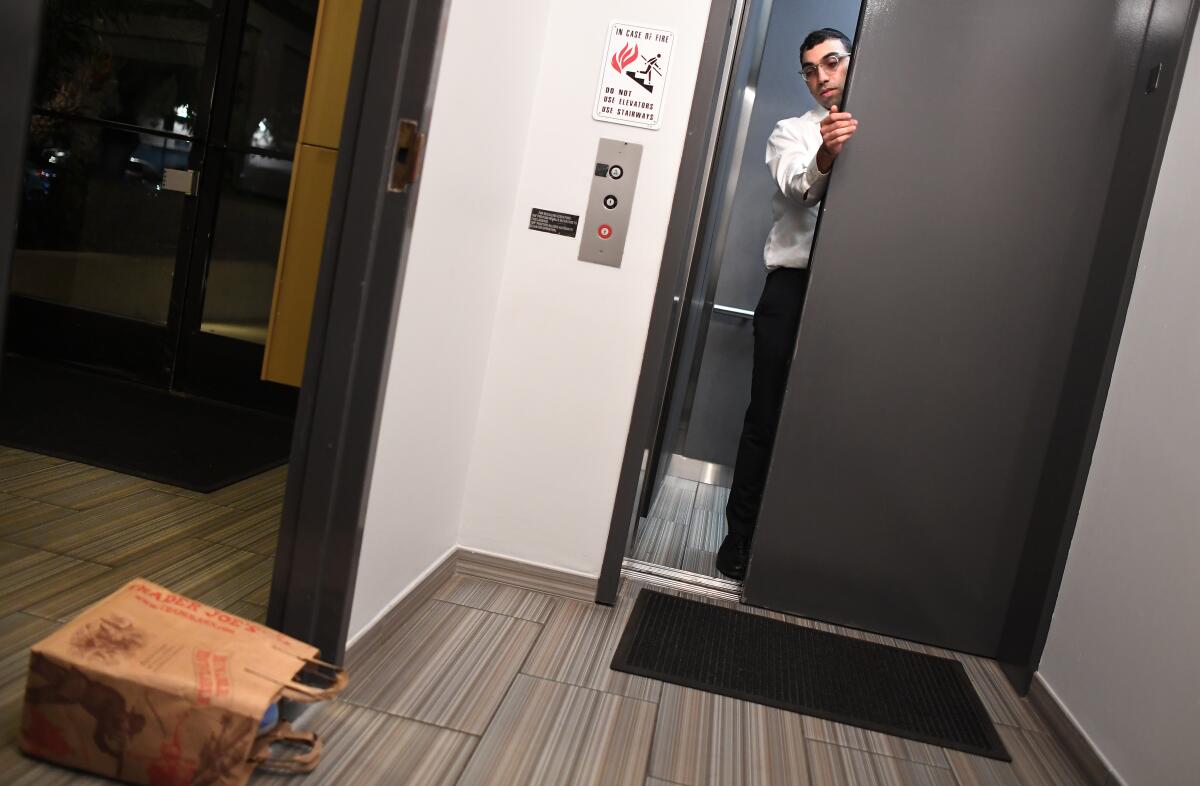
Rabbi Yosef Kanefsky of B’nai David-Judea Congregation in Pico-Robertson has received many questions on how people can help others during the crisis, which he considers “remarkable and not remarkable all at the same time.”
“The obligation to look after the needs of others and not just one’s own needs is a constant,” he said. “These are things that are true on the most ordinary Tuesday and things that are true in the same measure right now… It’s consistency and not morally excusing ourselves on the grounds that ‘I’m too anxious or depressed or upset.’”
For sisters Kayla Newman, 19, and Leeat Hatzav, 20, that sense of responsibility meant creating Shopping Helpers L.A., the WhatsApp group used by Moji and others to deliver supplies to people who are uncomfortable going shopping because they may be sick or more vulnerable to adverse effects of the virus.
“We thought, why not? There are so many young people, older people are always just helping us, it’s our time to help them,” said Newman, a college student in Pico-Robertson.
Once the sisters receive a request, they send a message to the group. A volunteer can then claim it and work out a method of reimbursement with the person seeking help.
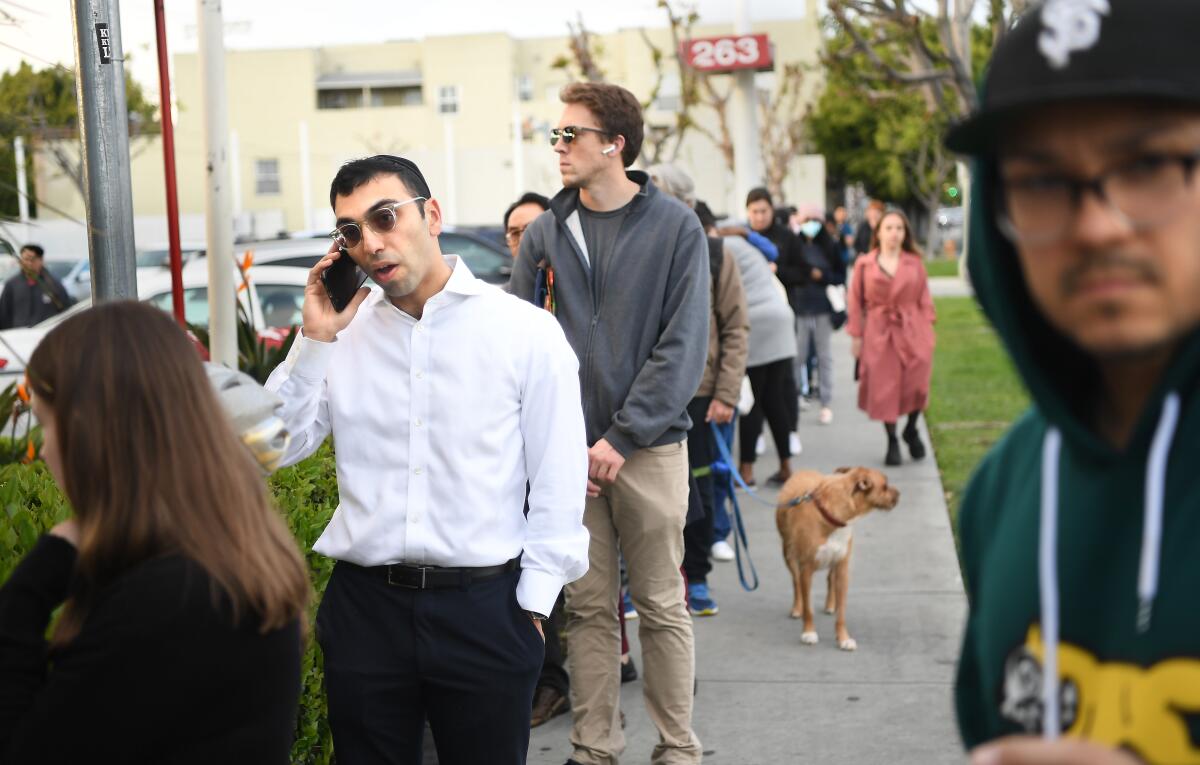
One volunteer, Miriam Tyner, a digital marketer and 34-year-old mother of two in Hancock Park, had been looking for ways to help seniors when she heard about the group on social media. She had already connected with one elderly woman she knew in her neighborhood but had thought it would not be appropriate to go door to door searching for others needing assistance.
“I didn’t want to knock on people’s doors, scare them and have them think I’m a scammer,” she said.
Through the WhatsApp group, she’s quietly dropped off groceries at the homes of three women. She’s had no close physical contact with any of them.
“If you want God to give you good, you have to do good for other people,” she said.
Moji, a resident of La Brea, began volunteering partly because he felt bad for profiting off the pandemic. After the city on Sunday night ordered gyms to close, Moji began receiving a rush of orders for the kettle bells that he sells online throughout the year.
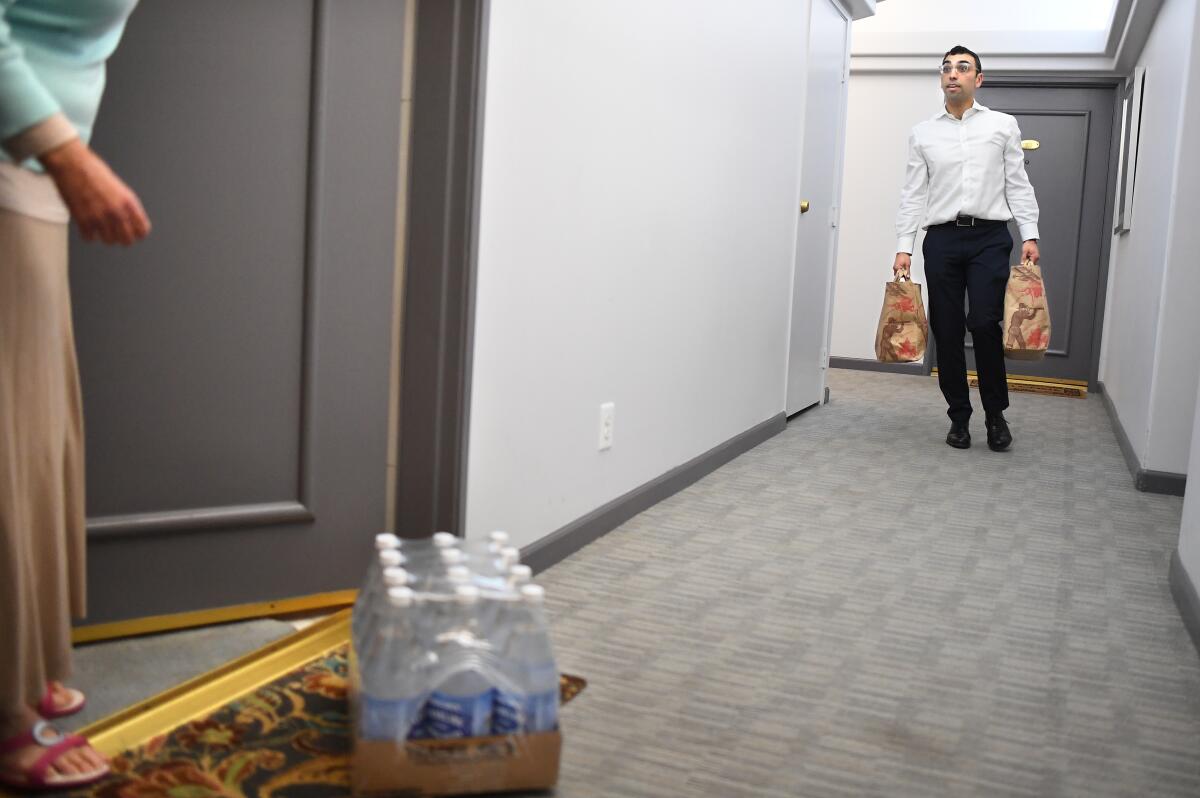
“I’m making money because of corona,” he said. “If I could give back, it would be very nice.”
But his first call Tuesday night wasn’t easy. It took trips to various markets by him, his mother and his sister to locate all the items requested by a woman who wanted kosher food for Passover.
Meanwhile, others have been working to help kosher restaurants and caterers survive the closure of their dining halls. Beverlywood resident Ronit Dahan-Edry said that after growing anxious from staying home for a week to protect herself from the virus, she decided to put her degree in emergency management to use.
On Sunday, she created a Facebook group to urge the community to order takeout at kosher businesses and support event planners. She’s encouraged restaurants to create videos to assure the public that staff members are using gloves, hand sanitizers and masks.
Many businesses have had to cancel their Passover catering at hotels and other venues — events that are often booked a year in advance. They’re now preparing Passover takeout meals that people can freeze or order just before the April holiday, she said.
Dahan-Edry has been working to help the businesses as early as 6 a.m. and keeps her phone close by during the day so she can immediately respond to questions from community members about where to get food. In between, she checks on her children and tries to clean for Passover.
“This is my personal therapy. I’m doing chesed to take my mind off of this uncertainty and worries,” she said, using the Hebrew word for goodness.
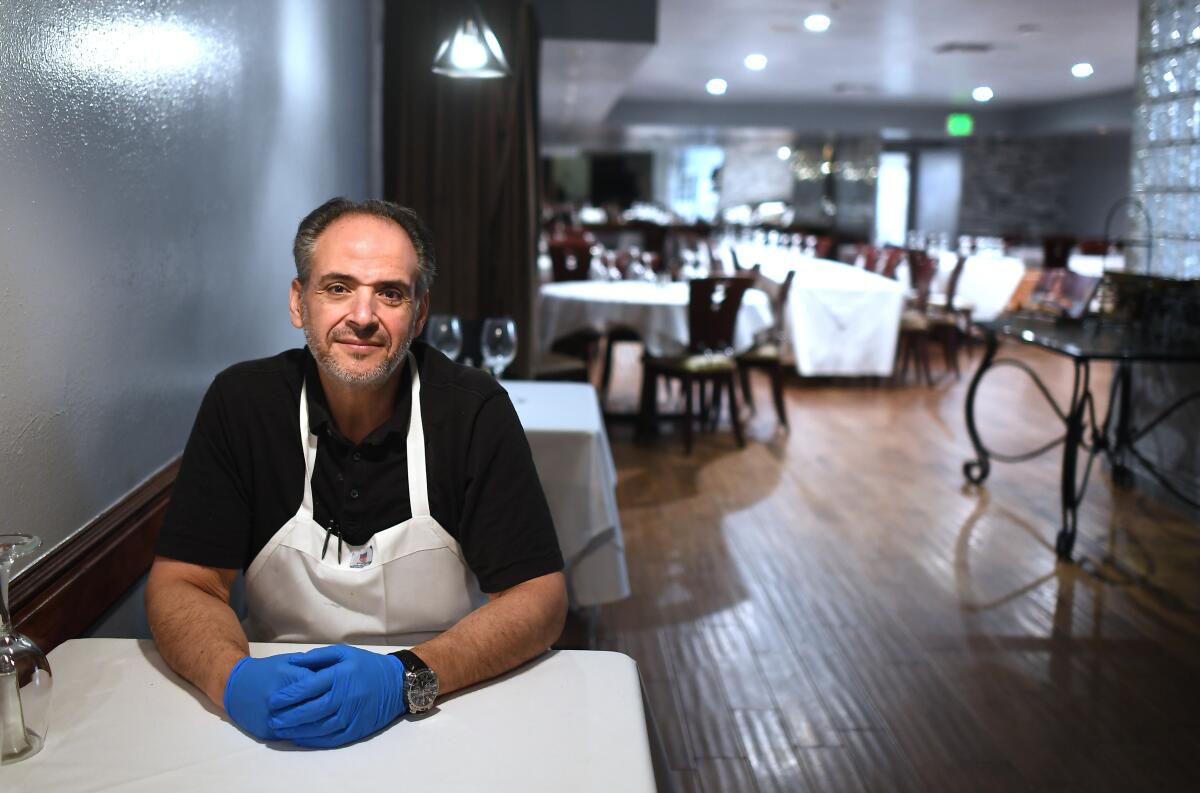
The efforts have been paying off, said Nir Weinblut, owner of La Gondola, a kosher fine-dining restaurant and catering service in Beverly Hills. He said he’s begun to see more support from the community and that neighboring restaurants have also been helping one another with deliveries.
“We’re all in this together at the end of the day,” he said. “If we don’t help each other now, when are we going to help each other out?”
With synagogues closed, rabbinic leaders have organized prayer and learning sessions online so that people don’t lose their sense of community. A letter signed by 21 rabbis has instructed congregants to pray at home and prohibited house or backyard prayer services. Ritual shiva visits to families in mourning should be made by phone or FaceTime, the letter said.
B’nai David-Judea Congregation has been holding daily check-ins on Zoom to help people to process the public health crisis. With family Passover meals canceled, many are anxious about being alone during the holiday. On Sunday, Rabbi Kanefsky will be teaching an online class to orient people who will have to prepare Passover by themselves for the first time.
“Community is so central to our lifestyle and our belief system,” said Rabbi Jason Weiner of Knesset Israel, a small synagogue in Pico-Robertson, who has been checking on all his members. “There’s a recognition of how difficult it is to lose community and how painful it is and how it’s important to find ways of making community. I’m hearing a lot of people talk about how connected we are from all this.”
In Trader Joe’s on Thursday night, Moji spent an hour adding frozen mango, calcium tablets, lavender hand soap and other items to a cart for his two drop-offs. He then drove to the first location at an apartment building in Pico-Robertson.
An elderly man wearing a mask opened the door of the complex as Moji lugged two shopping bags and a large pack of mineral water inside. As the man walked away, Moji shook his head.
“That man should not be going out,” he said.
He dropped the bags outside a unit where a check and a cash tip were tucked under the doormat. He left the bill there, and as he was leaving, a woman in her 70s opened the door. A cat circled her legs.
“Thank you,” she said, while Moji carefully stayed a few feet away.
With a quick nod and a smile, he headed to his next delivery.
More to Read
Sign up for Essential California
The most important California stories and recommendations in your inbox every morning.
You may occasionally receive promotional content from the Los Angeles Times.


